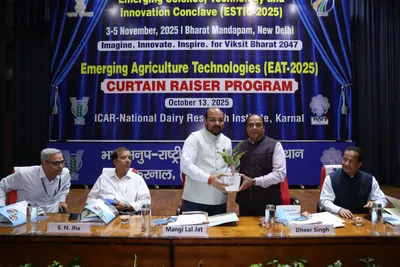Science
Innovations in Agriculture to Empower Farmers, Experts Say

Dr. Mangi Lal Jat, Secretary of the Department of Agricultural Research and Education (DARE) and Director-General of the Indian Council of Agricultural Research (ICAR), emphasized the critical need for science-driven innovation in agriculture. Speaking at a curtain-raiser event for the Emerging Agricultural Technologies (EAT) initiative under the upcoming Emerging Science, Technology and Innovation Conclave (ESTIC-2025), Dr. Jat highlighted that these innovations are essential to tackle challenges such as climate change, sustainability, and food security.
“Emerging agricultural technologies must empower farmers, improve productivity, and safeguard our ecosystems,” Dr. Jat stated. He led the event at the ICAR-National Dairy Research Institute (NDRI) on Monday, marking the start of a national initiative to accelerate technological integration in Indian agriculture. The event attracted senior officials, scientists, agro-industries, and experts from various ICAR institutions.
Driving Innovation for Sustainable Agriculture
The EAT thematic area under ESTIC-2025 aims to facilitate discussions and collaboration between engineering, biological sciences, and digital technologies. The focus is on creating resilient, efficient, and inclusive food systems, with particular attention to advancements in artificial intelligence, robotics, precision farming, and omics-based innovations in agricultural sciences. These efforts align with national goals such as Atmanirbhar Krishi and Viksit Bharat 2047.
Dr. Raghavendra Bhatta, Deputy Director-General of Animal Science at ICAR, underscored the significance of merging animal science with digital innovations. He noted, “Sustainable livestock development depends on our ability to combine traditional knowledge with emerging scientific tools.”
Dr. Dheer Singh, Director of ICAR-NDRI, articulated the institute’s commitment to applying research in ways that boost productivity and resilience within farming communities. He announced that ESTIC-2025 will take place from November 3 to 5 at Bharat Mandapam in New Delhi, with the inauguration led by Prime Minister Narendra Modi.
Creating a Collaborative Platform for Stakeholders
Dr. Anil Rai, Additional Director-General of Information and Communication Technology at ICAR, elaborated on the goals of ESTIC-2025, emphasizing the need for cross-institutional collaboration and effective technology dissemination. “ESTIC is India’s first joint platform for various stakeholders in science, technology, and innovation,” he stated.
The event will feature 11 thematic sessions involving 13 participating scientific ministries and departments, including Health, Education, Agriculture, Energy, Space, and Environment. This broad participation aims to unite researchers, industry professionals, academia, and government representatives, showcasing a comprehensive approach to advancing agricultural technology.
Through initiatives like EAT and ESTIC-2025, experts are optimistic about fostering a transformative environment for Indian agriculture, ensuring that farmers are empowered and equipped to face modern challenges. As the sector evolves, the integration of innovative technologies is expected to play a pivotal role in shaping sustainable agricultural practices.
-

 World3 months ago
World3 months agoSBI Announces QIP Floor Price at ₹811.05 Per Share
-

 Lifestyle3 months ago
Lifestyle3 months agoCept Unveils ₹3.1 Crore Urban Mobility Plan for Sustainable Growth
-

 Science3 months ago
Science3 months agoNew Blood Group Discovered in South Indian Woman at Rotary Centre
-

 Sports3 months ago
Sports3 months agoBroad Advocates for Bowling Change Ahead of Final Test Against India
-

 World3 months ago
World3 months agoTorrential Rains Cause Flash Flooding in New York and New Jersey
-

 Top Stories3 months ago
Top Stories3 months agoKonkani Cultural Organisation to Host Pearl Jubilee in Abu Dhabi
-

 Science3 months ago
Science3 months agoNothing Headphone 1 Review: A Bold Contender in Audio Design
-

 Sports3 months ago
Sports3 months agoCristian Totti Retires at 19: Pressure of Fame Takes Toll
-

 Top Stories3 months ago
Top Stories3 months agoAir India Crash Investigation Highlights Boeing Fuel Switch Concerns
-

 Business3 months ago
Business3 months agoIndian Stock Market Rebounds: Sensex and Nifty Rise After Four-Day Decline
-

 Politics3 months ago
Politics3 months agoAbandoned Doberman Finds New Home After Journey to Prague
-

 Top Stories3 months ago
Top Stories3 months agoPatna Bank Manager Abhishek Varun Found Dead in Well









